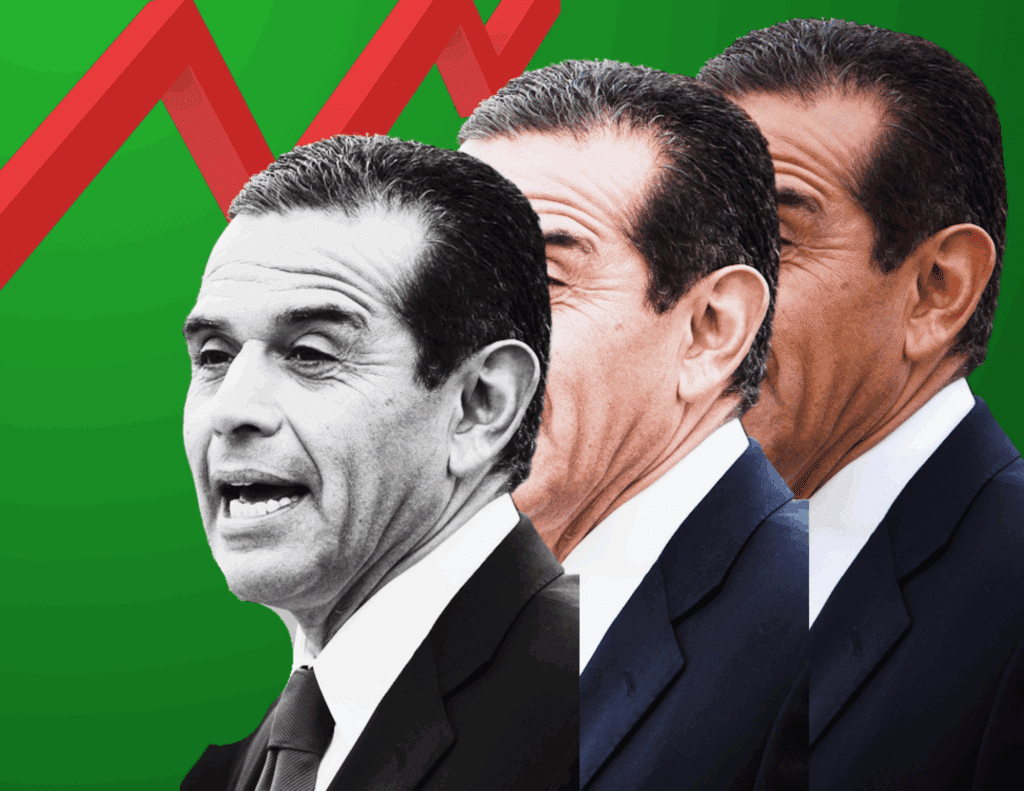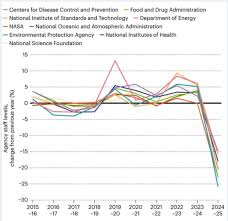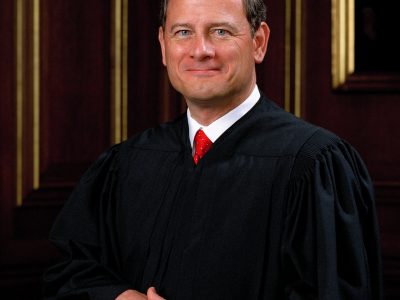Gas Price Politics and Desperate Moderates
The Drain is a weekly roundup of environmental and climate news from Legal Planet.

In 18 years of working in newsrooms around Los Angeles, I talked with lots of political campaigns — but a phone call from Antonio Villaraigosa in spring of 2018 stands out. I was at my desk in the cramped newsroom of KCRW, sitting in between All Things Considered host Steve Chiotakis and producer Ben Gottlieb, who were prepping newscasts when Ben’s office phone rang.
“Antonio Villaraigosa is ready for you,” the person on the phone said. “He’s sitting in the booth and ready to connect on ISDN.” In audio speak, that meant he was sitting in a studio outfitted with a high-quality digital connection (this is pre-Zoom) and that an audio engineer was ready to establish a connection with someone on our end. The only problem is there was no one on our end.
“Is someone interviewing Villaraigosa?” Ben asked around the newsroom. No one was expecting the former LA mayor turned candidate for governor. When we relayed this, the campaign person on the other end seemed anxious, even desperate, and insisted that Villaraigosa was available now if we wanted to speak with him. I never found out whether there’d been some misunderstanding, if the handler had promised him a non-existent interview, or whether the campaign’s tactic was just to call up media outlets and say “Wanna talk to our guy?” We assumed it was the latter. Either way, “Tony V is on ISDN” became a running joke about our former mayor’s willingness to do media — any media — until he got clobbered by Gavin Newsom and a longshot Republican candidate in the 2018 primary.
“Tony V is on ISDN” is exactly what I thought to myself this week while reading the Los Angeles Times report on Villaraigosa doubling down on oil industry support to try to boost his latest run for governor. The story (“Villaraigosa, despite climate credentials, pivots toward oil industry in run for governor,” by Seema Mehta and Laura Nelson) details how he’s received more than $1 million in campaign contributions and other financial support from fossil-fuel interests over the years.
Despite some environmental kudos earned while he was a tree-planting mayor, he’s positioning himself to be a moderate-lane candidate who talks about lowering gas prices. To be specific, he’s posing for campaign ads at a gas pump and talking about rolling back California’s “absurd” policies while filling his gas tank. Which policies? He doesn’t say, but he’s suggesting that California has been too tough on Big Oil refineries. I’d expect the local fights to phase out oil drilling to start showing up in the gubernatorial race. And while Governor Newsom is now running to the middle to help his future ambitions, he does have a record of standing up to Big Oil in two consecutive special sessions and all of this is going to be fodder for candidates like Villaraigosa to try to stand apart from current Lt. Gov. Eleni Kounalakis.
This is a shame because it continues to give oxygen to the false narrative that climate action is necessarily bad for low-income Californians’ pocketbooks. It’s not. (Just look at Trump’s energy policies and energy prices.) It also reads as desperate for a candidate who has to find something, anything, to be his middle-of-the-road platform. You can run on affordability and climate! Lose the desperation and you might score more radio interviews. Here’s hoping that the (many, many) other candidates to be California’s next governor have more ambitious and forward-looking positions on how to help the Golden State fight the climate crisis than Tony V.
Here’s what else I see this week…
Good news
The federal government can’t just shut down New York’s (so far very successful) congestion pricing program. A federal judge in Manhattan on Tuesday temporarily blocked a Trump administration threat to withhold federal transportation funds from New York as part of a White House scheme to undo the congestion pricing program that has driven down traffic and noise pollution and increased walking and public transit.
California officials speedily and forcefully announced their intention last Thursday to file their 23rd lawsuit against the Trump administration — this time, over the likely illegal attempt to upend the state’s stricter-than-federal car and truck emissions rules. The Thursday announcement followed the totally norm-busting 51-44 vote in the Senate that same morning, in which lawmakers passed a measure to try to repeal California’s phaseout of gas-powered cars. My UCLA colleagues Mary Nichols and Ann Carlson were quoted in the New York Times coverage. Ann also talked with Rolling Stone, the New Republic, and Vox about the senate vote.
New Mexico is the latest state moving to develop extreme heat protections for workers. The state’s Occupational Health and Safety Bureau is working on a proposed heat protection rule that was introduced this spring. The bureau, which is part of the New Mexico Environment Department, accepted comments on the proposed rule last week, Inside Climate News reports. The state’s environmental improvement board will hold a public hearing for the rule in July and, if adopted, it will go into effect in August.
Women currently make up less than 30% of electric vehicle owners. The good news is a Virginia-based nonprofit called Generation180 aims to boost that number. Headquartered in Charlottesville, the nonprofit has recruited some 7,000 other “EV ambassadors” nationwide to spread the word about their experiences online and in person via the “I’ll drive what she’s driving” campaign.
Bad news
None of the 21 Republican U.S. House members who spoke up in defense of the clean energy tax credits actually had the political bravery to vote against the Trump’s big budget bomb which tries to snuff out these incentives to the detriment of their state and constituents. Inside Climate News’ Dan Gearino reports on the political dynamics with some help from analysis by David Spence at University of Texas.
Vermont is changing gears and will not enforce electric car and truck supply mandates through the end of calendar year 2026. Gov. Phil Scott signed an executive order on May 13 to allow a 19-month delay, Inside Climate News reports, in part because of pressure from vehicle manufacturers as well as uncertainties stemming from the Trump administration’s tariffs and broad federal budget freezes and cuts. Massachusetts will also delay implementation of EV rules, but will still require automakers to file quarterly reports about their EV sales and marketing efforts.
North Dakota looks like it will become the fourth state to regulate its own coal waste disposal. Environmentalists say they’re worried about the relaxed safety standards as the industry gets a promise by the feds to look the other way. The EPA says it won’t review the state’s existing permits to see if they meet federal guidelines. It wants even more states to apply for coal ash oversight.
The DOE has ordered a Michigan coal plant scheduled to retire this week to stay open another three months, citing President Trump’s “energy emergency,” Jeff St. John reports for Canary Media.
California
- Some environmental groups wrote a letter objecting to Gov. Newsom’s proposed reauthorization of Cap-and-trade, err, sorry Cap-and-invest as not ambitious enough
- Fran Pavley, who sits on the Emmett Institute’s board, has a Q&A with Politico about the UCLA Blue Ribbon Commission on rebuilding LA more safely and resiliently.
- State appropriators on Friday announced the holding back of roughly 35 percent of bills in the Assembly and 29 percent of bills in the Senate (according to Chris Micheli’s tally).
- Mendocino County sits on “a prime geothermal zone.” Local leaders are ramping up efforts to prep residents for the jobs it creates, Canary Media reports in a 5-part series about rural developments in the clean energy workforce.
- The nonpartisan LAO office agrees with Gov. Newsom’s administration that the state is “likely to face persistent future deficits” which are expected to range from $10 billion to $20 billion through the next four years.
- A San Diego neighborhood called Dixon Trail is the first purpose-built “wildfire resilient neighborhood” in the country, report CalMatters’ Ben Christopher and Robert Meeks in a story for PBS about the challenges of statewide home hardening.
- California officials sent water flowing to create new wetlands along the shores of the shrinking Salton Sea, Ian James reports. The project is intended to control dust and environmentalists say it could provide habitat for fish and birds.
- Ian James also has the scoop on new research (based on satellite data) that shows the depletion of groundwater in the Colorado River Basin far exceeds losses from the river’s reservoirs.
Climate Liability
- The “Why California Needs the Polluters Pay Climate Superfund” webinar hosted by the Climate Center and featuring Assemblymember Dawn Addis who is a sponsor of the California Polluters Pay bill
- A Peruvian farmer in the Andes is challenging a European energy giant as a German court nears a landmark climate ruling, NPR reports.
- We know that Big Oil funds sports, cultural institutions such as museums, and youth organizations, but new research sheds light on this greenwashing. “Dozens of documents uncovered by a U.S. Congressional investigation appear to confirm those suspicions—demonstrating that API and oil giants BP, Shell, and Chevron have used sponsorships to allay public concerns over their role in the climate crisis while simultaneously lobbying against policies aimed at tackling it,” reports Rebecca John for DeSmog.
Other stories, studies, policy papers worth your time
- The BLM approved its first proposed project under Trump’s energy emergency declaration and its fast-tracked 14-day environmental review process. The project is the Velvet-Wood uranium and vanadium mine south of Moab, Utah.
- “All Hell Breaks Loose: How Big Oil Ruined a Small Texas Town” by Alex Ip for The Xylom
- NYT reporter Cara Buckley wrote about going vegan because of a chocolate cake and asked other editors and writers to weigh in on the cake.
Media Industry News
- NPR and three Colorado public radio stations filed suit Tuesday morning in federal court against the Trump White House over the president’s executive order purportedly barring the use of Congressionally appropriated funds for NPR and PBS. It’s a First Amendment challenge. Guess who’s representing NPR? Theodore Boutrous, a partner in the Los Angeles office of Gibson, Dunn & Crutcher who represents Chevron, a role in which “he draws on his First Amendment background to argue that oil companies shouldn’t face legal consequences for deceiving the public about whether climate change is real,” as one report put it. Boutrous was himself on NPR this morning talking about the lawsuit.
- Politico’s Debra Kahn has started a column called “Currents,” covering energy and climate policy that will “range over the vast space of energy and climate politics, engaging innovators and executives and leaders of governments in Sacramento and Washington and other capitals across North America and beyond.”
- NPR climate editor Sadie Babits has a new book, “Hot Takes: Every Journalist’s Guide to Covering Climate Change” and she sat down with LA Times Boiling Point columnist/podcast host Sammy Roth to talk about why the media has long overlooked the climate crisis, and how that’s starting to change.
One last story

I just got back from a week in Acre, Brazil where the Governors’ Climate & Forest Task Force wrapped up a major summit on Friday. The GCF Task Force is the world’s largest subnational governmental network focused on forests and climate. The event included nitty gritty working meetings and technical exchanges between state governments to define the priority topics that should be addressed by states leading into COP30, the UN climate talks in November.
I’ll have much more to say about the Brazil meeting and what it means for COP30, which has been termed the “Forest COP.”
Suffice it to say that it was a hard week to be celebrating success on forests. The annual survey of global forest loss by the World Resources Institute just came out. That survey, based on data from the University of Maryland, got major coverage, and it is mostly bad news. In 2024, fires were the main cause of forest loss in tropical forests for the first time since WRI’s survey began two decades ago, Climate Home News notes. “It is not just clearing for agriculture that is the main driver [of forest loss],” WRI’s Rod Taylor said. “Now we have this new amplifying effect – a real climate-change feedback loop with fires much more intense and much more ferocious than they have ever been.”
But lost in some of the coverage was that important context: fires were the main cause of forest loss. States and local actors are making some headway on forest policies, but climate-fueled fires can erase that progress in one fire season. These climate-fueled fires are coming for us all, from Los Angeles to the Amazon. Brazil understands the stakes, so maybe that country is perfectly positioned to host COP30.







Reader Comments